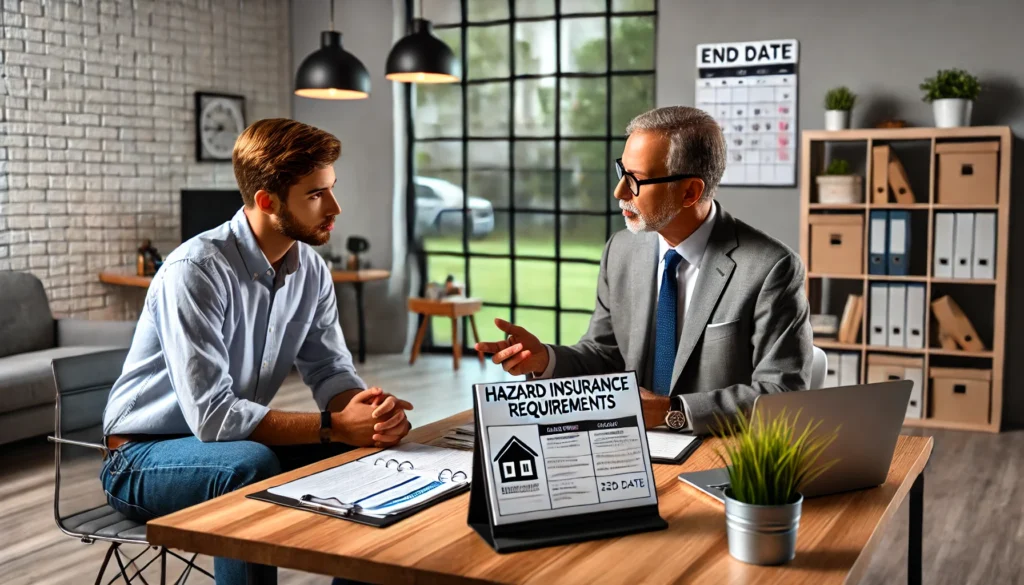When Can I Stop Paying Hazard Insurance?

Purchasing a home is a big milestone. But along with it comes the responsibility of insurance payments. One common type is hazard insurance. It covers damage from events like fires, storms, or vandalism. Many homeowners wonder if there’s ever a time when they can stop paying for it. Let’s dive into when it’s safe to stop paying hazard insurance and what you should consider before making that decision.

What Is Hazard Insurance?
Hazard insurance is a specific part of a homeowner’s insurance policy. It focuses on covering damage to your home’s structure. If a fire, windstorm, or other disaster hits, hazard insurance can help pay for repairs. This is not the same as mortgage insurance, which protects the lender. Hazard insurance focuses on protecting your property and your investment.
Why Is Hazard Insurance Required?
Lenders typically require hazard insurance if you have a mortgage. They want to protect their financial interest in your property. If your home is damaged, insurance ensures repairs get done. Without it, a lender could face huge losses if a disaster destroys your home. That’s why they include it when you sign your loan agreement.
When Can You Stop Paying for Hazard Insurance?
You can stop paying for hazard insurance if you meet certain conditions. The most common is paying off your mortgage completely. Once you own your home outright, the lender has no stake in your property. At that point, maintaining hazard insurance is your choice. But remember, dropping coverage could be risky.

Factors to Consider Before Dropping Hazard Insurance
- Location Matters: Keeping insurance is wise if you live in a region prone to natural disasters, like hurricanes or earthquakes. It can protect you from expensive repair costs.
- Home Value Protection: Your home is a big investment. Hazard insurance helps keep its value intact if unexpected damage occurs. Without it, you may have to pay for repairs yourself.
- Future Resale Value: If you plan to sell your home, keeping insurance could make it more appealing to buyers. A well-protected property is often more valuable.
- Peace of Mind: Insurance provides financial security. It can relieve stress knowing you’re covered if something goes wrong, even if it’s not required.
How to Cancel Hazard Insurance Properly
If you’ve decided to stop paying for hazard insurance, follow these steps to cancel it safely:
- Pay Off Your Mortgage: Confirm your mortgage is fully paid off before canceling any required insurance.
- Notify Your Insurance Company: Tell them you want to cancel your policy. Be prepared to provide documentation.
- Check for Penalties: Some insurance companies might have cancellation fees. Review your contract to avoid surprises.
- Get a New Policy if Needed: If you still want some coverage at a lower cost, consider switching to a basic homeowner’s insurance plan.
Pros and Cons of Dropping Hazard Insurance
| Pros | Cons |
| Saves money on monthly premiums | Leaves you unprotected from damage |
| Provides more financial flexibility | It could cost more in repairs in the long run |
| Reduces your expenses once the mortgage is paid off | Potentially reduces your home’s resale value |
Common Myths About Hazard Insurance
- Myth: Hazard insurance is optional if you have a mortgage.
- Fact: Lenders almost always require it.
- Myth: Hazard insurance covers everything.
- Fact: It only covers specific events like fires and storms.
- Myth: Once you own your home, you should drop insurance.
- Fact: While you can drop it, it’s not always the smartest choice.
What Happens if You Stop Paying Hazard Insurance?
Sometimes, if you cease paying for hazard insurance while you still have a mortgage, your lender will purchase one. This is known as force-placed insurance; as you might expect, it is pricier. It also may not be as comprehensive as a standard insurance policy. Before changing anything, always consult with your lender.
FAQs
- Can I cancel hazard insurance after paying off my mortgage?
Yes, once your mortgage is paid off, you can cancel hazard insurance, but it is advisable to keep some protection coverage. - Does hazard insurance cover floods or earthquakes?
No, hazard insurance typically covers only specific events, such as fires or storms. You need separate policies for floods or earthquakes. - Will my lender find out if I cancel my insurance?
If you cancel hazard insurance while still having a mortgage, your lender will be notified and might get force-placed insurance. - Is hazard insurance the same as homeowners insurance?
No, hazard insurance is just a part of homeowners insurance, which covers more, including liability and personal belongings. - Can I lower my hazard insurance premium?
Yes, increasing your deductible or bundling policies can reduce your premium. You can also shop around for better rates. - What if my hazard insurance lapses?
If your policy lapses, your lender can enforce a policy that might be costlier and offer less coverage. It’s best to avoid lapses.
Final Thoughts
Liability insurance is a necessity for many homeowners. It is possible to stop it once you are done paying your mortgage, but opting out has downsides. One must always consider a proposal on the two sides: the conveniences and the inconveniences. Maintaining your home insured can provide you with security and security. The decision should always be made depending on your current location, financial position and future plans.
Keep Learning
> How Often Do Mortgage Rates Change? A Complete Guide
> Gift Of Equity in Home Mortgage Loans: Maximizing Home Equity

